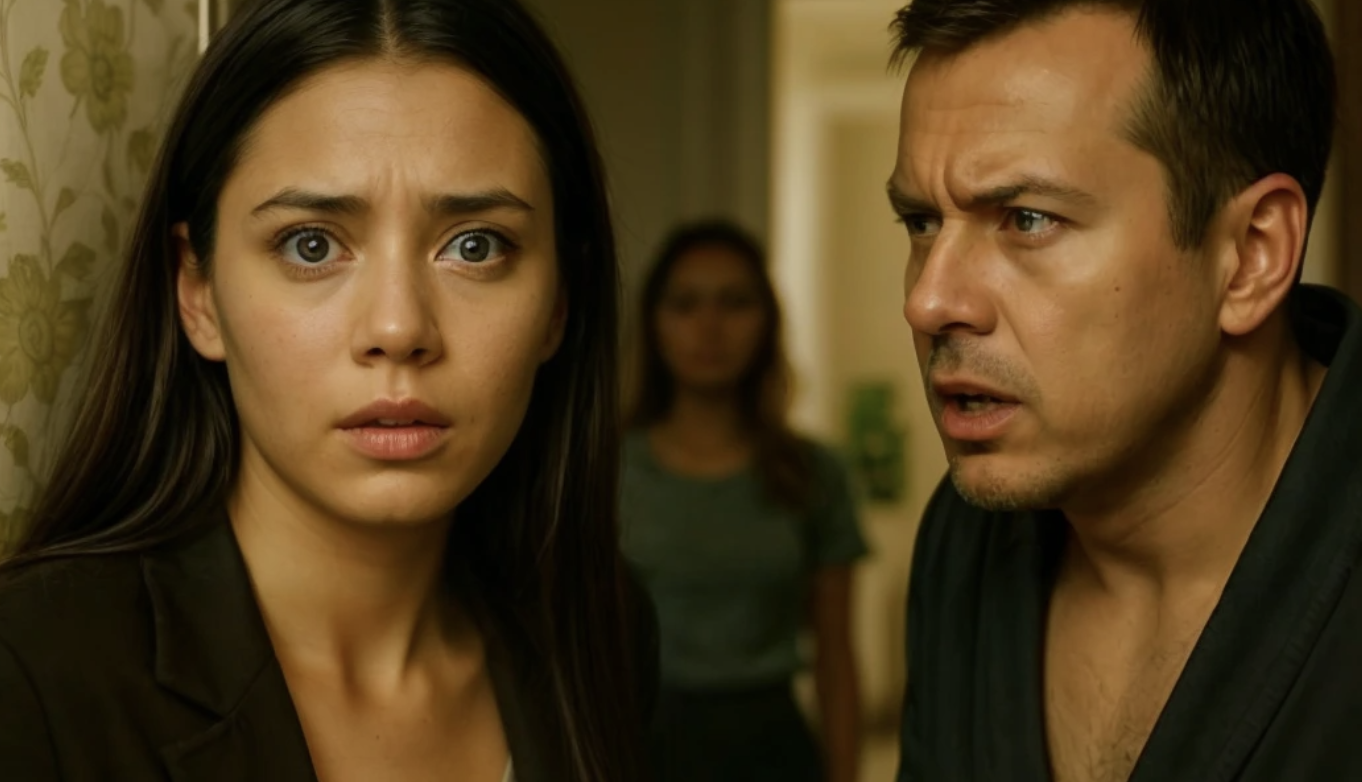Yulia threw a jacket right over her home T-shirt and slung her bag over her shoulder. In the taxi, she looked out the window, clutching a pack of marshmallows from Voronezh — Sergey liked exactly those, in the pink packaging. She just wanted to come in, hug him, surprise him. She missed him. The hearing was postponed — so two days together.
The elevator moved slowly, as always. She was going up to her floor — her heart was beating faster than usual. She glanced at the clock: ten to eight. She would make it before dinner, before the evening bustle. Now she would open the door — and he would be surprised.
Sergey didn’t open immediately — the door opened slightly, and he peeked out sideways. His face seemed blank for a second, then he quickly composed himself.
“Why are you here so early?” He went pale, his voice trembling. “You said you’d come only in two days.”
Yulia nodded toward her bag:
“The hearing was postponed. I thought I’d surprise you.”
A woman’s voice came from the kitchen — Nastya was talking on the phone, laughing. A second later, she appeared in the doorway — the neighbor from apartment twenty-two. Yulia knew her name, knew she worked at the pharmacy across the street. They had seen each other and nodded.
“Hi, Yulia!” Nastya was holding a plate with a half-eaten cake. “I just dropped by for a minute,” Nastya put the plate on the table. “Sergey helped with the faucet, so I wanted to say thanks.”
Yulia set her bag against the wall.
“I don’t recall you ever visiting us,” she said dryly.
Sergey stepped closer, trying to smile:
“We just stopped by for a couple of minutes. Why are you immediately… Nothing like that.”
“Uh-huh,” Yulia nodded. “I’m going to shower.”
In the evening, late, after Nastya left and tense silence hung in the apartment, Yulia sat on the sofa, took off the hair tie, and leaned back. Sergey was clicking something on his phone, not looking at her.
“Was the cake good?” Yulia looked at him.
“Just normal. Nothing new,” he replied without looking up.
The next morning she woke early, got up silently. Decided to unpack and clean. In the nightstand drawer were long-expired warranties for appliances, old receipts. One fell and got stuck under the bed. She bent down — a thin white rectangle with a logo of a restaurant on Teatralnaya Street. The amount — over three thousand. Date — three days ago.
She put the receipt on the kitchen table. Sergey entered wearing shorts and a tank top, stretching.
“What’s this?”
“Your bill. The restaurant, the amount — you won’t mistake it. I don’t go to restaurants — I don’t have money for that,” she nodded.
He grabbed the paper, frowned:
“What, are you some kind of detective now? Checking? Don’t trust me? This is ridiculous.” He threw the receipt back. “Oleg called. He’s having trouble with his wife. We drank, talked. You know he always comes to me for advice.”
Yulia didn’t answer. Just turned to the window.
On the weekend they went to their son Artem’s camp. The weather was hot, the road empty. The camp was bustling with children’s voices. Artem ran out to meet them, hugged them both, then pulled Yulia by the hand: “Come, I’ll show you where we draw!” She followed him, nodding to Sergey to wait.
In the craft room, kids sat at long tables, some drawing, some cutting colored paper.
Artem pulled Yulia to his spot, showed a sheet with little people and a house: “That’s you. And there’s Arseniy — he lives in the next group. We became friends.”
Then came lunch. They sat at a separate table; Artem talked about morning exercises, campfires, how the counselor played guitar. Yulia laughed, eating without looking. Sergey sat nearby, nodded, but barely joined in. Then he got up, went for juice, and stopped by the counselor in a red T-shirt. He said something, she smiled, he helped carry a box. Yulia saw how he lightly touched her hand. The girl’s eyes sparkled.
Yulia sat on a bench, wiping her hands with a napkin, watching. Artem finished his pilaf, unaware of anything. It all seemed trivial. But it wasn’t.
On the way back, Yulia looked out the window. Then suddenly said:
“You’re awfully friendly today.”
“Here we go again. You always misunderstand,” he grumbled. “Don’t start, okay?”
“I thought that was flirting.”
He hit the steering wheel with his palm:
“Stop catching me on small things. Don’t you have anything better to do?”
Later that evening she called Marina.
“Hi. Can I come over? For a couple of hours. I need to talk.”
Marina lived in an old house with a balcony smelling of baked apples and dried chamomile. They sat in the kitchen, the kettle boiling.
They sat a long time, drinking tea, chatting about school, camp, the city. Yulia told everything — about Nastya, the receipt, the counselor. At first calmly, then haltingly. Marina listened, barely interrupting.
“Listen, I have a friend who works as a waitress there. I can ask. That restaurant — the one by the square, you said,” Marina said when Yulia fell silent, staring at her cup.
“Thank you,” Yulia nodded, wrapping her hands around the cup.
The next day was long. Midway — a call.
Marina called near lunchtime. Her voice was cautious:
“She was on shift. Says your guy came with a girl. Dark hair, blue sundress. Looks a lot like Nastya.”
Yulia was silent. Then quietly:
“Thanks. I’ll call back.”
In the evening she put a bottle of wine on the table, poured herself a glass, sat down. Sergey came out of the bathroom in a robe, wet hair, red spots on his cheeks. He was drying his head with a towel, cast a quick glance at the table.
“Nastya was here. At the restaurant. With you. You paid. Coincidence?”
He froze. Then sat on the edge of a chair:
“I didn’t want to tell you, was afraid you’d misunderstand. It’s just… she had a hard day. We talked. Nothing else.”
Yulia stood up:
“Do you take me for a fool? You cheated the moment you chose silence. Tomorrow you move out. One day, that’s all.”
He jumped up:
“Are you serious?”
“Absolutely.”
“I didn’t do anything! Wait!”
“It’s clear with you. No need to justify.”
“Why should I move out?”
“Because the apartment is mine.”
He sighed loudly, turned to the door:
“I did all the repairs here! Half with my own hands! We have a son, calm down!”
Yulia was already leaving for the bedroom:
“I won’t tolerate betrayal. You know that.”
Right after the talk with Sergey, Yulia packed a bag and called a taxi. The decision was simple — go to her mother’s, somewhere quieter.
The next morning Yulia woke in her childhood room — wallpaper with faded stars, a shelf with her school books. In the kitchen, Valentina Pavlovna, her mother, bustled about in an old floral robe.
“Good morning,” Yulia said entering the kitchen.
“Sit down,” her mother answered without turning. “I made porridge. Eat it hot.”
Yulia poured herself tea, set the cup down, but didn’t touch it.
“You didn’t come for no reason, right?”
Yulia nodded slowly. “Sergey and I broke up.”
Her mother sat down opposite, elbows on the table.
“What happened with you two?”
Yulia looked at her and began to tell. About Nastya, the receipt, the camp. She spoke without breaking down, but every word was a full stop. Her mother listened quietly, only shaking her head.
“I’d still think about it. You have a child. This isn’t a game.”
“I thought about it. He’s just not part of it anymore.”
After breakfast, they silently folded laundry, then went to the market — to buy tomatoes and greens. They came back with bags, mostly silent. At the doorstep her mother suddenly said:
“Has he called you?”
“He did. I didn’t pick up.”
“And if he comes?”
Yulia shrugged: “Let him come. But the door is closed.”
In the evening, while Yulia cleaned the veranda, her mother came out with a mug, stood silently. Then suddenly said:
“Your father… We had something like this. I didn’t tell you before. I forgave. We lived together for 17 years after. Not perfectly, but we lived.”
Yulia said nothing. Went out to the yard, sat by the cherry tree. Legs on the wet grass, palms on her knees. The silence muffled everything. The house behind her breathed light.
Late at night the phone buzzed. Sergey.
“I understand everything. It’s my fault. Give me a chance,” his voice was weak, almost childlike.
“You had your chance. You were inside it. Now — no.”
“What about Artem? Have you thought about him at all?”
Yulia hesitated, then answered:
“Did you think about him when you started all this?”
He didn’t argue. Just hung up.
The next day she returned to the apartment. In the hallway stood a bouquet — white lilies and blue irises. A note: “Sorry. If you can. I didn’t want to.”
Yulia walked past, silently put the bouquet in a vase, filled it with water.
The following days dragged on. Sergey called, texted — brief, often. Once he came over — she didn’t open. Then — silence again.
A week later Yulia picked up Artem from camp. He came in with his backpack, wearing a cap, tanned. Threw his shoes in the hallway, went to the kitchen.
“Mom, where’s Dad?”
Yulia was at the sink, drying her hands on a towel. Turned:
“He did something unforgivable. But he’s still your dad. That doesn’t change.”
Artem was silent, sat on a stool.
“What now?”
“Now it’s just you and me. But honestly.”
He nodded. Then got up, came over, hugged her waist.
“Don’t be upset. I’ll be with you now.”
Late at night Yulia went to the kitchen, turned on the light. The table was empty. One glass. She poured water, stood by the window. The city slept. Her heart, too. Quietly, but irreversibly.
The next morning she took off her ring, put it in the drawer with Artem’s children’s drawings. Wiped the kitchen table, brewed coffee. Sat down at the laptop. A new case. A new life. No explanations. No returns.
On Saturday morning Yulia opened the door — Irina Viktorovna, Sergey’s mother, stood there. In her hands — a bag with jam and a box of pies.
“I just want to talk,” she said immediately. “No accusations.”
Yulia stepped aside, let her in.
In the kitchen, Irina Viktorovna sat down, took out napkins, unpacked the box.
“You both have lost your minds. I’m not excusing my son. But you’re not strangers.”
“I’m not going back to the past. I’m just living,” Yulia said calmly.
“Artem is small. He should have… well, a family. You’re throwing everything away like yesterday’s newspaper.”
“I’m not throwing anything away. I’m just not lying.”
Irina Viktorovna bit her lip, stood up.
“I’ll tell him not to interfere. But if you decide — just call. You’re not alone in this. Understand?”
When she left, Yulia immediately washed the cups, put the food in the fridge, as if wanting to erase any trace of the visit.
A couple of days later Marina came by — brought cake, sat on the windowsill.
“Still drawn to him?”
“No. Just drawn to habit. And to silence,” Yulia stirred her tea. “Silence is the best thing so far.”
Artem did homework in the kitchen after school. Sometimes glanced at Yulia’s laptop.
“Do you always have such thick cases?”
“Sometimes worse. But we manage.”
He nodded, drew a little person with a folder in his notebook.
Late at night Yulia found an old box on the shelf — under photos and school certificates lay a thin note. Long forgotten. A letter to herself at about twenty: “Never be afraid to leave those who don’t listen.”
Yulia read it, folded it again. Put next to it the second key to the apartment — let it stay here, since it’s no longer needed.
In the morning she went out on the balcony with a cup of coffee. The air was clean, smelling of rain and greenery. Somewhere below Artem called a friend for a bike ride.
Yulia returned to the room, opened the window. The apartment was cool, easy to breathe. And suddenly, for the first time in many months, she allowed herself a smile — not at memories, not at hope, but simply at herself. Because this morning was hers. Completely. Forever.



